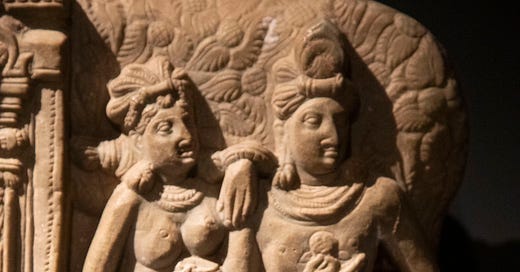Photo: Detail from a Platform panel (ayaka) or courtyard enclosure Phanigiri, Suryapet district, Telangana Ikshvaku, 3rd-4th century CE Limestone Department of Heritage, Telangana, Hyderabad
From The Metropolitan Museum of Art show, Tree and Serpent
I have an ongoing concern that we’re often too analytical about inner work.
Where did this begin? Perhaps with P. D. Ouspensky, who was a mathematician and a scientist. What would have happened if an artist or a poet, if a musician, were the one who had reported the gist of Gurdjieff’s ideas in the first place? I don't know. But what seems certain to me is that, while there are important technical aspects to understanding the nature of the soul, they are not perforce of an analytical nature.
Yet we are on the whole strangely drawn into analyzing everything we do, by using the intellectual mind. Self observation becomes an analytical process; not the development of a new relationship, but the ongoing explanation of what a relationship is.
How can this be avoided? If we become too touchy-feely, won't that degrade the quality of our work? I don't have the answer for that. But I’m quite sure that we need to work more with our spiritual intuition than our analytical abilities if we wish to get a better sense of who we are at the root of our soul. Our soul isn’t an analyzer; it was placed here to be an experiencer. To take in the world as a duty and a responsibility; to, as Ibn Arabi put it in his classic work, The Bezels of Wisdom, a pupil in the eye of God.
Keep reading with a 7-day free trial
Subscribe to Zen, Yoga, Gurdjieff: Lee's Gurdjieff Newsletter to keep reading this post and get 7 days of free access to the full post archives.





